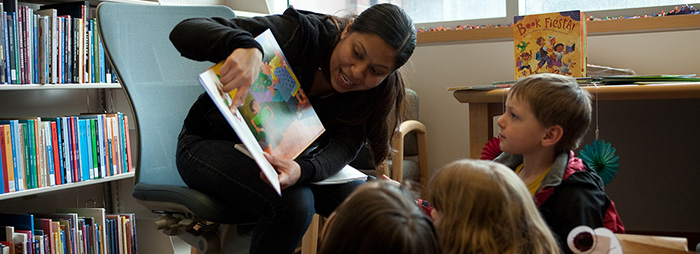How George Washington Can Inspire Honesty In Kids

EWULibraries via Flickr | http://bit.ly/VIq1X7
(Inside Science) -- From magical wooden puppets to wolves that munch on shepherd boys, parents for centuries have turned to storybook characters to teach their children social mores and values. Despite these cautionary tales, studies show kids begin to lie as early as ages 2 or 3 -- almost as soon as they start stringing words into sentences.
Now, researchers have found that some kinds of stories may work better than others at encouraging children to be more honest.
Researchers from the University of Toronto found that children owned up to a mistake more readily when they heard a story that praised honesty. But listening to a story where a protagonist suffered for lying made little difference in a child's behavior. The research, recently published in Psychological Science, reveals that the fear of punishment may be a weaker motivator than the promise of praise.
Some previous studies show that inductive methods – praising positive behaviors – promote desirable traits. But other work demonstrates that fear of punishment or danger can deter immoral actions.
"We know very little about how to promote honesty in kids or adults," said Kang Lee, a psychologist at the University of Toronto and lead author on the study. "We think these moral stories promote certain behaviors, but we cannot really take them for granted."
To test the stories, the researchers shortlisted three classic tales: "Pinocchio," "The Boy Who Cried Wolf," and "George Washington and the Cherry Tree." A fourth story "The Tortoise and The Hare," which has nothing to do with lying and dishonesty, was used as a neutral control.
The researchers assessed children's honesty by placing a noisy toy out of sight of their 3- to 7-year-old participants. Children were asked not to peek at the mystery toy while an experimenter stepped out of the room briefly. When they returned, they read one of the four stories aloud, and then asked the children if they had peeked.
Children who heard stories with negative consequences were told, "I don't want you to be like the boy who cried wolf [or Pinocchio]. I want you to tell me the truth, OK?" Others were asked "to be like George Washington in the story" when they answered.
Most children looked at the toy, though the tendency to peek was lower in older participants. Listeners who had peeked were three times more likely to confess after they heard about George Washington owning up to his deviant cherry tree chopping than after they heard about being eaten or shamed by a growing nose as punishments for dishonesty.
"The results were the opposite of what I expected," said Lee, who thought the shepherd's tale would be the most impactful. "It threatens the kids with 'You're going to die!' if you lie."
In a second test, the researchers switched the positive ending of the cherry tree story. Instead of owning up, the "negative George Washington" lied to his father about chopping the cherry tree down, and was punished by having his axe taken away. Children who heard this version were only as truthful about peeking as those who heard "Pinocchio" or "The Boy Who Cried Wolf."
"I would have predicted all the stories would have had some effect," said Leslie Carver, a psychologist at the University of California, San Diego who was not involved with the work. "I was a bit surprised by the specific findings that it was so closely tied to the positivity of the stories."
The context of the punishment stories may have played some part in the results, according to Lee. Since their participants were recruited from modern Canadian cities, the children may not have been able to relate to a wooden puppet or a shepherd boy.
"We don't know yet whether the fairy tale context made a difference," he said. "Maybe a more realistic story will drive the lesson home better."
The results indicate that highlighting behaviors that value concern and empathy for another could benefit young children's moral behavior, according to the researchers. Future studies will test how long the effects of such stories last and how dishonesty develops in children with severe emotional or behavioral problems.
Though previous studies have examined why children lie, few researchers have examined how stories might help encourage honesty early in life.
"This opens up a lot of future research," said Carver. "Certainly as a parent it's made me think twice about the strategies we use with our kids."
Jyoti Madhusoodanan is a science writer based in San Jose, Calif. She tweets at @smjyoti
